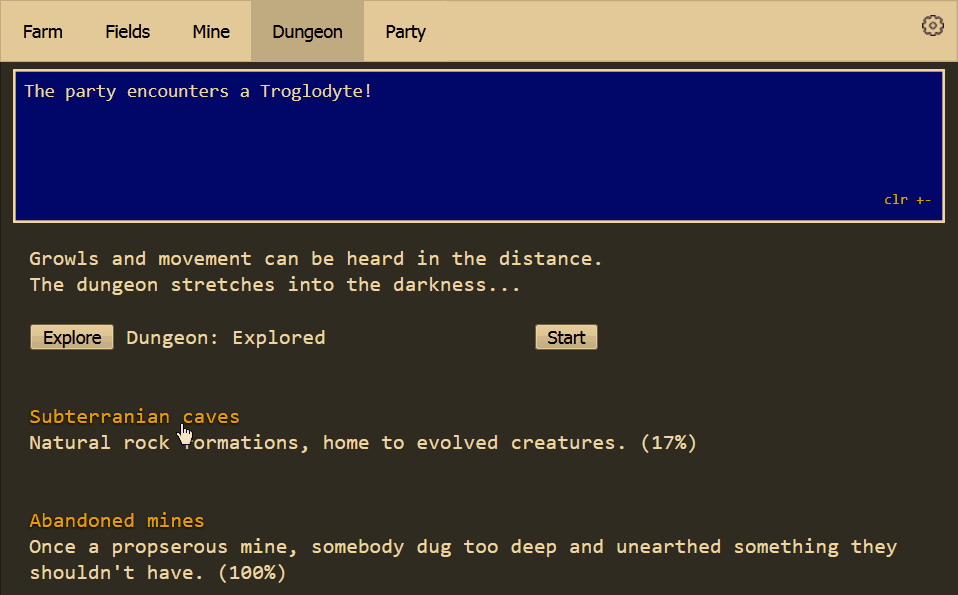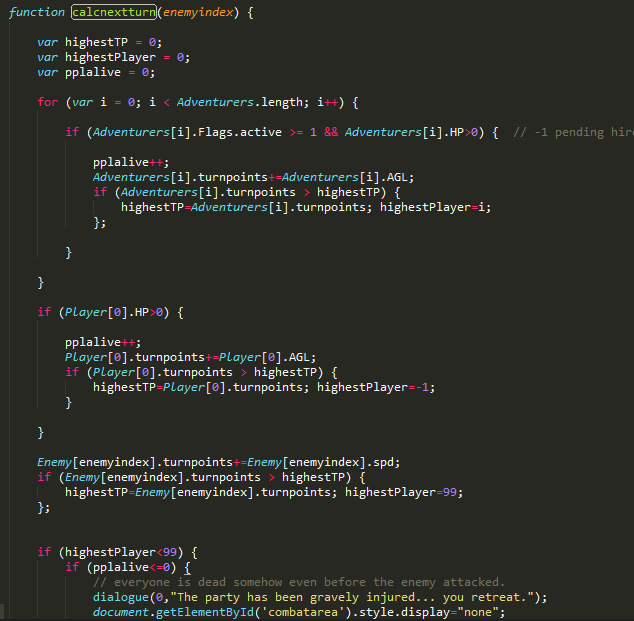Update 7: Parties & Dungeons
This update sees the introduction of party-based combat and a series of 4 dungeons to progress through. Battles are turn-based, the game uses a basic "speed" calculation system to determine turn-order, and (for now), everyone patiently takes turns hitting things until something dies. Or the whole party is dead. Fun times.

(ignore the funky colouring - my display was on night settings)
Summary of progress:
- Party-based combat framework integrated, with basic "attack" and "defend" actions
- 10 monsters added to the game
- 4 dungeons added, which need to be "explored" in order
- Adventurers are only added to combat if they are in the "active" party
- Adventurers heal over time, but not when in combat
- All adventurers can now equip weapons!
- Dismiss adventurers button
- Clicking on the adventurer #number opens a popup adventurer menu for more options:
- shows their stats
- toggle "active" or "inactive" for being in the main (combat) party
- and the "discharge" button
Building the game systems to this point was a lot more work than I expected. An RPG is definitely way more complex than the incremental side. There are so many menus, people and stats to keep track off, and things like equipping things and dying, that all need their own functions to be coded. Getting the systems in place took a lot of work... And a lot more debugging. I repeatedly used the word "systems" rather than just game, but at this point that is what it is: it's not a game, but a game system. I realised there is a key point when a series of game systems becomes a "game", where everything starts interconnecting and the player is driven by some sort of progression (most often some sort of story, or at least "winning the game").
Dungeons
I won't be able to finish a "game" within the next few days, but at least I can try and tie it together with some sort of purpose. There are now 4 dungeons and a prelimary area, let's call it the "zero dungeon" for now, which gets discovered after fully exploring the cave. The first (zero) dungeon is not dangerous at all and easily tacklable by the player. From there, new proper dungeons open up, but get more dangerous. The player pretty much needs to recruit Adventurers from the first real dungeon onwards.

Currently each time you click "explore" there is a 3/4 chance of facing combat. The monster that appears depends on the "dangerlevel" of the area. Once you've managed to get 100%, the next dungeon opens. It's not implemented yet, but completing the final dungeon (good luck with that!) will give some sort of "Victory!" message.
Attack/Defend
Currently there are two options: attack and defend. Attack is self-explanatory, doing direct damage based on str (for now). Defense is slightly more complex, it halves damage received until your next turn. It also "costs" less (more on that below), meaning a character who "defend"s will act again a bit sooner.
Sadly, that is as complex at combat will get during the game jam, I think, due to time limits. In future, I definitely would like a skill system, but... c'est la vie for now.
Turn-based Order
To determine turn order, I used a method loosely based on Final Fantasy Tactics' system. Characters have a "Turnpoints" property. Each round, their AGL is added to it. The character with the highest Turnpoints then acts that turn. After acting, their TP is set to 0. And everyone's TP is calculated again for the next round. Repeat.

Right now every action sets TP back to 0, making the turn order roughly fixed. (Eventually a faster character will skip ahead every now and then) But the system is flexible enough to enable a number of potential neat features:
- I could make skills or attacks that affect turnpoints, thus changing turn order. E.g. "interrupt" which halves target's TP, or "stun" which sets a them outright to 0.
- Skills lowering AGL would have an important effect on combat! E.g. "slow" spell.
- There's even more room to expand the TP system further:
- Different actions could have different TP costs. This could be based on the type of action, like attacking takes all TP but defending only cost 80%, meaning defenders will move again sooner.
- But I could also assign each ability/skill its own "TP cost". So we could have all sorts of things like quick, weak but fast slashes. Fast fireballs, or slow powerful explosions.
Lots of options here, which is exciting. Sadly, I won't have time to implement anything that makes use of it during the game jam. But it's nice to know the framework is there.
Monsters







(art from Opengameart.org)
There are currently 10 monsters. Growing from a simple slime up to dragons and the evil warlock, your final goal.
I thought I could leave things like AI to the side for now but no, just even picking a "random" target required a lot of work. It can't be a pure random number range, e.g. 1-4, as the adventures and party size are all variable, so I needed to code a (basic) system to "choose" a target. Of course, this still requires various checks. Is the target alive? And so on.
Once again, this is as simple as it will get in this "game jam version", but being forced to implement the framework of a system does mean future behaviours can be added more easily. Some potential stuff:
- Add a "aggro" property that builds up (and can be affected by skills, equipment, etc) that creates a bias on the "random target"
- Add skills that add statuses such as "target" which cause all enemies to attack that round
- Add skills which, conversely, set "aggro" to 0. Such as "hide" or "invisible" which will be good for rogues and casters.
Next Steps
With the addition of enemies and dungeons, there's scope to make some kind of "winnable" scenario for the game jam.
There's a bunch of technical things that are still needed, like making armour equippable, and actually implementing weapons and armour to affect dmg or def.
In the bigger picture, the systems need to be tied together. Primarily, the incremental side needs to feed the RPG side. Adventurers need to require reputation (gained from clearing dungeons) to appear and cost money to hire. Weapons and armour need to cost money and resources to "craft". Each dungeon needs to scale in difficulty enough so that you need new adventuers, weapons, and armour to progress. That will drive expanding and upgrading your farm to afford this stuff.
I haven't had much chance to get to focusing on narrative, though I do have plans. For now, I need to at least create a mystery and clues, so that people want to not only finish this intial "game jam version" but with a cliffhanger ending that raises more questions, that can only be answered when you play the "post jam version."

